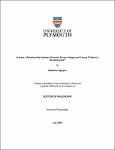Is there a Relationship between Parents' Screen Usage and Young Children’s Development?
| dc.contributor.supervisor | Floccia, Caroline | |
| dc.contributor.author | Nguyen, Delphine | |
| dc.contributor.other | Faculty of Health: Medicine, Dentistry and Human Sciences | en_US |
| dc.date.accessioned | 2024-02-09T16:25:23Z | |
| dc.date.available | 2024-02-09T16:25:23Z | |
| dc.date.issued | 2024 | |
| dc.identifier | 10679147 | en_US |
| dc.identifier.uri | https://pearl.plymouth.ac.uk/handle/10026.1/22045 | |
| dc.description.abstract |
There has been growing concern over the links between children's screen time use and cognitive development (Halton, 2020). However, researchers have generally overlooked the possible impact of parental screen time, which might decrease the opportunities of learning and social interactions for young children. To address this gap, we investigated the relationship between parental screen use and toddlers’ development. However, the start of this thesis coincided with the Covid-19 pandemic, and a few experimental tasks had to be adapted online. Thus, this thesis examined first whether online paradigms can provide valid data (word recognition, word learning and language assessment). Second, the main objective was to explore the relationship between parental screen use and young children’s language skills, and to revisit the link between parental screen time and children’s empathy. Findings from Chapter 2 provide support for the reliability of online testing with children. These experiments point to promising avenues of investigation in early language studies, and to possibilities for reaching out to families around the world. Findings from Chapter 3 revealed no impact of parental phone text on children’s learning in a lab situation. However, they suggest that parental responses to technoference and attitudes towards smartphones may moderate the relationship between parental screen use and children’s development. When examining effects in real life, a first exploratory study indicated an effect of parental screen time (in real life) on children’s language vocabulary when assessed via a parental questionnaire, at least for children aged 16 months and above. A second study was conducted with more objective measures of screen time and children’s vocabulary knowledge, and no association was found between parental screen time and children’s language when assessed via a standardised face-to-face language test. Findings from Chapter 4 showed a negative association between children’s alone screen time and their cognitive empathy abilities. However, parental screen time was not related to children’s cognitive empathy. The experiments and studies reported in this thesis fail to reveal a robust association between parental screen time and early language, at least in the population that we have studied here. Importantly, the findings suggest how parental screen use may be a moderator in children’s development and not a causal factor. They demonstrate the need to investigate more precisely why and how parents use electronic devices such as mobile phones during interactions with their children, might directly influence early language and emotional development. | en_US |
| dc.language.iso | en | |
| dc.publisher | University of Plymouth | |
| dc.rights | Attribution 3.0 United States | * |
| dc.rights.uri | http://creativecommons.org/licenses/by/3.0/us/ | * |
| dc.subject | parental screen time | en_US |
| dc.subject | technoference | en_US |
| dc.subject | language development | en_US |
| dc.subject | infant | en_US |
| dc.subject | toddler | en_US |
| dc.subject | child development | en_US |
| dc.subject | online testing | en_US |
| dc.subject | monolingual English | en_US |
| dc.subject | empathy | en_US |
| dc.subject.classification | PhD | en_US |
| dc.title | Is there a Relationship between Parents' Screen Usage and Young Children’s Development? | en_US |
| dc.type | Thesis | |
| plymouth.version | publishable | en_US |
| dc.identifier.doi | http://dx.doi.org/10.24382/5143 | |
| dc.rights.embargoperiod | No embargo | en_US |
| dc.type.qualification | Doctorate | en_US |
| rioxxterms.version | NA | |
| plymouth.orcid_id | 0000-0001-8841-9583 | en_US |
Files in this item
This item appears in the following Collection(s)
-
01 Research Theses Main Collection
Research Theses Main



